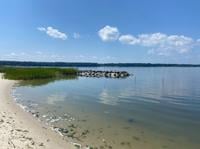MARYLAND - The Chesapeake Bay’s health declined in 2024, but continues to show long-term improvement, according to the University of Maryland Center for Environmental Science’s latest report card.
The 19th annual Chesapeake Bay and Watershed Report Card gave the Bay an overall score of C, 50 percent, while the broader Chesapeake Bay Watershed earned a C+, 57 percent. The report measures environmental, economic and societal indicators to track restoration progress across the region.
This year’s decline, a five-point drop from 2023, is attributed in part to extreme rainfall and heat, which led to nutrient-heavy runoff and uneven water quality across the watershed. Still, officials say restoration efforts are yielding results over time.
Dr. Fernando Miralles-Wilhelm, President of UMCES said, “This year’s report underscores the importance of continued investment and highlights the progress we’ve made over the last decade.”
Despite the overall drop in score, six regions showed upward trends: the Elizabeth, James, Patapsco and Back Rivers, Upper Western Shore, Upper Bay, and Lower Bay. Key environmental indicators such as dissolved oxygen, aquatic grasses, total phosphorus and total nitrogen also continued to improve over time according to the report.
UMCES attributed those gains to years of management and restoration, including wastewater upgrades, seagrass and oyster restoration and watershed planning by local and state agencies.
The Watershed health score factored in both societal and economic measures. While job growth earned a high score, income equality remained low, suggesting economic benefits are not shared equally across the region. A poor societal factor was heat vulnerability, due to increasing temperatures and limited tree canopy in some communities.
“There was a substantial upturn in the overall Bay Health score in 2024, and it came down a little this year. Over the long term, though, there is still an improving trend from the 1980s until now,” said Dr. Heath Kelsey, Director of UMCES Integration and Application Network. “We think extreme weather may have had some impact on the scores this year.”
As UMCES celebrates its centennial year, a 1925 Chesapeake Bay Report Card was created to reflect back on Chesapeake science and look forward to the future of a healthier and more vibrant Bay and Watershed.







